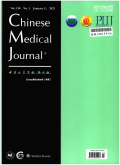Salvianolic Acid B Down-regulates Matrix Metalloproteinase-9 Activity and Expression in Tumor Necrosis Factor-α-induced Human Coronary Artery Endothelial Cells
摘要Background:Salvianolic acid B (Sal B) is a bioactive water-soluble compound of Salviae miltiorrhizae,a traditional herbal medicine that has been used clinically tor the treatment of cardiovascular diseases.This study sought to evaluate the effect of Sal B on matrix metalloproteinase-9 (MMP-9) and on the underlying mechanisms in tumor necrosis factor-α (TNF-α)-activated human coronary artery endothelial cells (HCAECs),a cell model of Kawasaki disease.Methods:HCAECs were pretreated with 1 l0 μmol/L of Sal B,and then stimulated by TNF-α at different time points.The protein expression and activity of MMP-9 were determined by Western blot assay and gelatin zymogram assay,respectively.Nuclear factor-κB (NF-κB) activation was detected with immunofluorescence,electrophoretic mobility shift assay,and Western blot assay.Protein expression levels of mitogen-activated protein kinase (c-Jun N-terminal kinase [JNK],extra-cellular signal-regulated kinase [ERK],and p38) were determined by Western blot assay.Results:After HCAECs were exposed to TNF-α,1-10 μtmol/L Sal B significantly inhibited TNF-α-induced MMP-9 expression and activity.Furthermore,Sal B significantly decreased IκBα phosphorylation and p65 nuclear translocation in HCAECs stimulated with TNF-α for 30 min.In addition,Sal B decreased the phosphorylation of JNK and ERK1/2 proteins in cells treated with TNF-α for 10 min.Conclusions:The data suggested that Sal B suppressed TNF-α-induced MMP-9 expression and activity by blocking the activation of NF-κB,JNK,and ERK1/2 signaling pathways.
更多相关知识
- 浏览89
- 被引14
- 下载12


相似文献
- 中文期刊
- 外文期刊
- 学位论文
- 会议论文



 换一批
换一批 换一批
换一批



